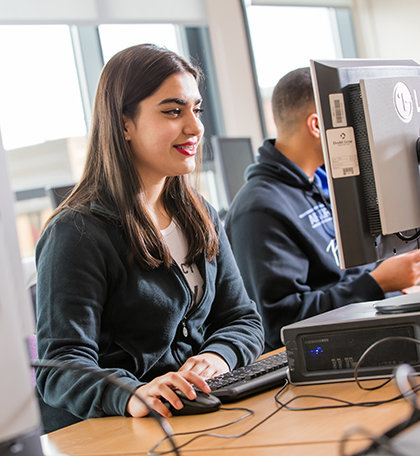 Success at A Level, BTEC National or CACHE depends on your habits, routines, attitudes and approaches to study. It is your behaviours, not your intelligence, that determine your results. VESPA (which stands for Vision, Effort, Systems, Practice and Attitude) is a mind-set that will help improve your success. Students who are successful:
Success at A Level, BTEC National or CACHE depends on your habits, routines, attitudes and approaches to study. It is your behaviours, not your intelligence, that determine your results. VESPA (which stands for Vision, Effort, Systems, Practice and Attitude) is a mind-set that will help improve your success. Students who are successful:
- Know what they want to achieve (VISION)
- Complete many hours of independent study (EFFORT)
- Organise their learning resources and their time (SYSTEMS)
- Practice and develop their skills (PRACTICE)
- Respond constructively to challenge (ATTITUDE)
Managing your Learning
Success on your course will depend largely on you. While your teachers and your academic coach will help as much as they can, your final results will depend on the amount of effort you make throughout the course. You will need to make the best use of the resources available, both your own and the College’s.
To help you achieve the best results possible your subject teachers, supervised study teacher and academic coach will work with you, helping you to think about your goals, set targets to enable you to reach those goals and monitor your progress.
You will be set regular homework/independent study by your teachers. This enables you to reinforce your learning. It also allows staff to see how well you are getting on with your studies, and forms the basis of predicted grades, which are vital when making UCAS applications for university places.
Independent Study
You will hear a lot about independent study once you move on to your level 3 course. But, you may well ask, what is independent study? It is well documented that in order to achieve your potential grades at A level, BTEC and on CACHE you must do independent study, that is, study outside of your timetabled classes for each subject. You will have a supervised study session and some free time incorporated into your timetable that you should dedicate to some subject related study, which will prevent you studying all night, every night and all weekend! Each A level subject or timetable block of other courses requires a minimum 5 hours/week independent study. So, what counts as independent study? Independent study might consist of the following:
- Teacher set tasks, essays, research – what you might be familiar with as homework!
- Revisiting / rewriting your class notes – so that you don’t forget them (consolidating your learning) and so that they are more easily accessible for revision for your examinations.
- Reading around the subject or topic you are learning about in class – ask your teacher for a reading list if you’re not sure where to begin, although our well stocked library might be a good place to start!
- Reading ahead in your text book – yes, that’s right, you don’t have to wait until your teacher tells you to read chapter 5, just dip in.
- Watching a documentary or DVD – something related to your subject / topic.
- Reading a newspaper article relevant to your subject – some of the broadsheet newspapers have sections dedicated to science, literature, sociology and media to name but a few. You will find copies of daily newspapers in the library and online.
- Visits and Trips – visiting museums and galleries or trips to the theatre to enhance your understanding of your subjects.
- Undertaking private research – relevant to your area of study.
- Flipped Learning – Your teacher sets preparation tasks needed to take a full and active part in a planned lesson.
Action Planning and Target Setting
As Level 3 learners, you need to take an active approach to your learning. It is critical that you engage with the action planning and target setting process. This process:-
- encourages you to take responsibility for planning your learning;
- helps you to make clearer and better informed decisions;
- enables you to identify your long/short term goals and reach them;
- helps you to self-evaluate, which means recognising your strengths and weaknesses;
- involves target setting to help you to tackle weaknesses and achieve short term goals;
- focuses on your achievements.
This is an ongoing process and you will work with your academic coach and teachers regularly reviewing progress and setting new targets.
Monitoring Student Progress
Students are assessed through a variety of methods throughout their time at College and at regular intervals a student’s progress is recorded and made available on Tyber. For an A level student, this will take the form of a grade awarded after a ‘Key Assessment’. Key Assessments take place across both years and students are encouraged to take them very seriously. The grade awarded for each Key Assessment will be recorded and made available on Tyber. BTEC students do not complete Key Assessments as they are already continuously submitting work to be formally assessed. BTEC teachers will however record a ‘Working At’ grade, indicating the general standard of work being produced by a BTEC student, at the same points in the year Key Assessments take place.
Both BTEC and A level teachers also periodically report on a students’ effort level within each course they take. Key Assessment or ‘Working At’ grades, effort grades and live attendance data are all made available via Tyber throughout the year and routine oversight of a student’s Tyber account by parents or carers is strongly recommended, as is attendance at parents’ evenings.

